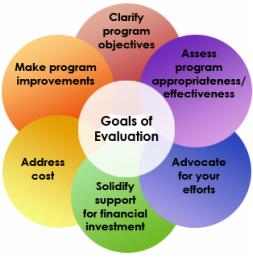Assessment for Learning MOOC’s Updates
Evaluations
The fundamental purpose of an evaluation is to make a judgment about the quality or worth of an educational program, or proficiency of a person’s actions as opposed to assessment which measures a person’s knowledge.
In education, we evaluate to determine the effectiveness or quality of a program, to collect information on student learning and to gauge the quality of our teaching staff. The data collected from evaluations or assessments is used to improve the quality of the education provided. The two fundamental reasons to assess is to monitor effectiveness and to improve. Without evaluating programs, staff, or student learning, improvements cannot be made efficiently. The analysis of data collected from evaluations allows for targeted improvements in teaching, by comparing the results to the reuslts of assessing student knowledge.
Evaluations are widely used to measure the effectiveness of a program in meeting desired outcomes and are intended to include evidence-based arguments. The purpose of the evaluation is to guide future programming. Not necessarily to test or revise the program, but to guide future targeted programming.
The evaluation process critically examines a program. It involves collecting and analyzing information about a program’s activities, characteristics, and outcomes. Its purpose is to make judgments about a program, to improve its effectiveness, and/or to inform programming decisions (Patton, 1987). The evaluation process is the social and technical practice of gathering and using data to make judgements of quality about particular program or intervention.
Within evaluations equity has a role: equity of access to participation in the program, equity of experiences, and is the program is equally engaging different kinds of participants. Evaluation often takes place in some kind of policy or other decision context. The question of funding a program and if the program is worth the money and or time. Other stakeholders may want to know if the intended outcomes can be attained, and if the program is going to meet expectations. The presence of stakeholders within the program evaluation process along with the equity should not be discounted.
In essence the goal program evaluation or any evaluation is to gather data to determine effectiveness and use that information to make informed decisions to improve, adopt or discontinue a program or behavior. Influences of evaluator values and stakeholders influences should not be overlooked during the process of evlauting.
Patton, Q. M. (1987). How to use qualitative methods in evaluation. Newsbury Park, London, New Dehli: Sage Publications.



This is well informative
This is well-informative